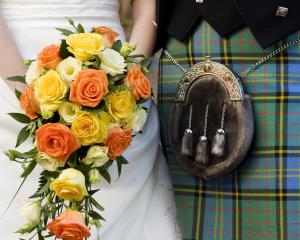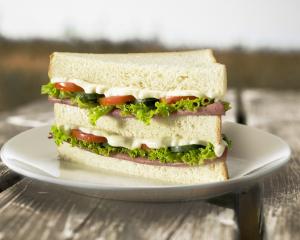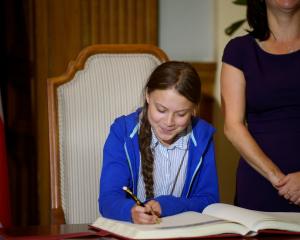I regarded the hole he had left with both surprise and curiosity.
"But Dad, why does God hide potatoes in holes?
" A student of the Book of Revelation will smile knowingly and murmur: "Damn deep question." The more practical citizen may observe: "I don't think this kid was born with the gardening gene."
Living in the country's most beautiful small township, I am surrounded by gardeners. Front lawns and verandas in Arrowtown are bordered with carefully tended masses of colourful blooms. Behind these cottages and houses, lined up in orderly ranks, are respectful rows of carrots, lettuce and cauliflower. Living amid this splendour minus the gardening gene, I feel a little left out, perhaps like the patient in the old story about the asylum inmate and the gardener. The inmate spotted the agriculturalist tending his plants on the far side of the sanity fence.
"What's that you're putting on your strawberries?
" the inmate asked.
"Cow manure," the gardener replied.
"You must be crackers," said the patient. "In here we have them with cream."
I've only had one brush with serious gardening. It began when my former partner and I visited Sissinghurst Castle, where 1930s writer Vita Sackville-West created one of England's most famous gardens. Visits to castles and grand estates make us forget our place in life and dream. I was taken by the stone tower that the aristocrat poet and novelist had purloined for her writing room. Why, with my own writing tower, I could pound out a thousand words a day, no problem.
The female of the species made a different take on Sissinghurst. Soon after we arrived home, the delivery trucks began arriving. They bore peonies, tulips, lilies and snapdragons.
But mainly rose bushes - roses by the hundred. The snag was that each required a planting hole be dug, and each hole required a bloke with mattock and spade to slug away at soil spiced heavily with river stones. I was a chain gang of one. A neighbour inquired, not that politely but with justification, whether we were intent on botanical gardens.
I'm not totally useless in the garden, just moderately. I've learnt a few of the basics - rose bush holesmanship obviously, but also that the difference between a plant and a weed is that the plant pulls out easily, that you tread warily around people who talk about their compost boxes, and there's no economy in growing cabbages when you can get them for $3 each at the supermarket.
People see an innate virtue in gardening, so they make assumptions about gardeners that are sometimes over-kind. It is then we should remember that Joseph Stalin, too, loved to potter in his glasshouse, and could be tiresomely insistent that people sample his lemons.
When Napoleon was exiled to St Helena after the carnage of Waterloo, he took up gardening.
He also gave small presents to several children who helped him out. One gift from a general, more aptly nicknamed The Little Corporal than we realise, was a small wagon pulled by four live mice.
The venerable English magazine, Homes and Gardens, wishes it could bury its November 1938 issue.
Published shortly after Adolf Hitler occupied Austria, it carried an admiring lifestyle article titled: "Hitler's Mountain Home - a visit to Haus Wachenfeld".
"There is nothing pretentious about the Fuhrer's little estate," the magazine reported, noting he liked to decorate its halls with flowers from his gardens.
Its writer observed that Hitler enjoyed relaxing on his terrace from which "a chain of drowsy lakes is seen far below, with ancient shrine-chapels hidden in ferny folds of towering rocks.
"When State Affairs are over the Squire himself, attended by some of his guests, will stroll through the woods into hamlets above and below," we read. "It is then the little ones are invited to the house. Coffee, cake, fruits, and sweets are laid for them on trestle tables in the grassy orchards. Then Frauen Goring and Goebbels, in dainty Bavarian dress, arrange dances and folk songs, while the bolder spirits are given joy rides in Herr Hitler's private aeroplane."
There are some pretty dodgy garden folk too. Not all are saints of the soil.
• John Lapsley is an Arrowtown writer.











